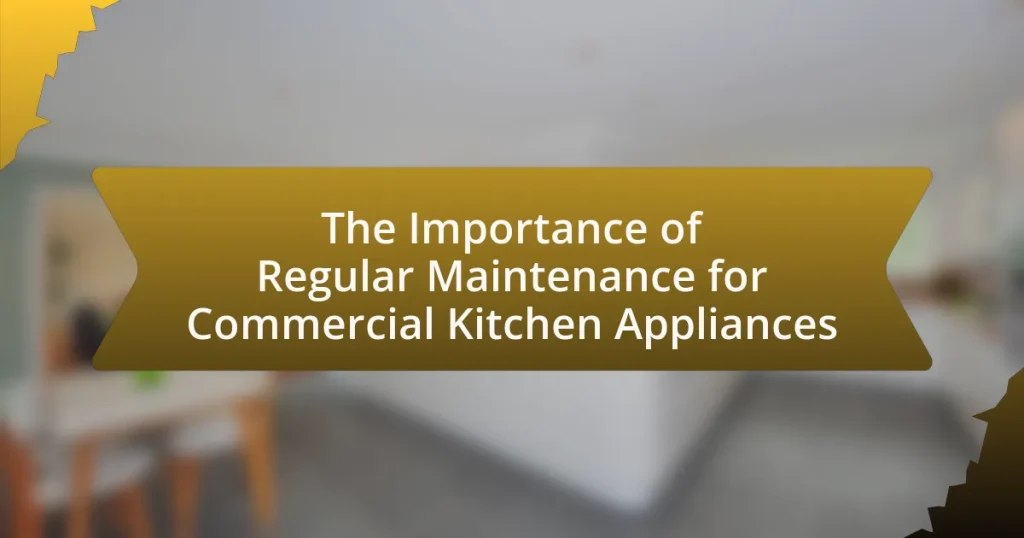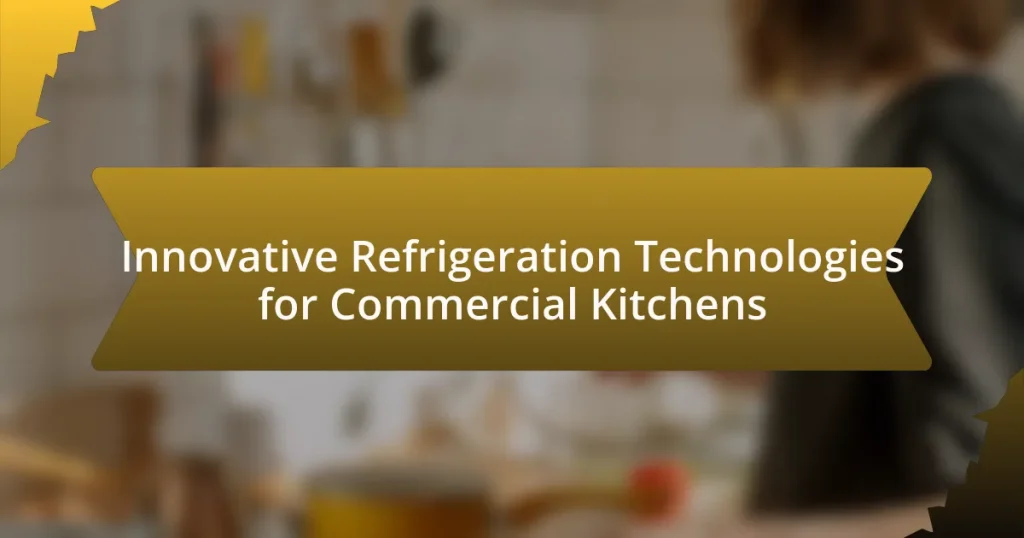Regular maintenance of commercial kitchen appliances is crucial for ensuring optimal performance, extending equipment lifespan, and preventing costly breakdowns. Neglecting maintenance can lead to significant risks, including equipment failure, safety hazards, and increased operational costs. The article outlines the financial benefits of regular upkeep, such as reduced repair costs and improved energy efficiency, while also detailing best practices for maintenance, compliance with health regulations, and the importance of staff training. Additionally, it emphasizes the need for a systematic maintenance schedule and the role of professional services in maintaining kitchen equipment effectively.
Why is Regular Maintenance Important for Commercial Kitchen Appliances?
Regular maintenance is important for commercial kitchen appliances because it ensures optimal performance, extends the lifespan of the equipment, and prevents costly breakdowns. Regular checks and servicing can identify potential issues before they escalate, reducing the risk of equipment failure during peak operation times. According to the National Restaurant Association, proper maintenance can lead to a 20% increase in the lifespan of kitchen equipment, which translates to significant cost savings over time. Additionally, well-maintained appliances operate more efficiently, leading to lower energy consumption and reduced utility bills.
What are the potential risks of neglecting maintenance?
Neglecting maintenance of commercial kitchen appliances can lead to significant risks, including equipment failure, safety hazards, and increased operational costs. Equipment failure may result in unexpected breakdowns, causing disruptions in food service and potential loss of revenue. Safety hazards, such as gas leaks or electrical malfunctions, can endanger staff and customers, leading to serious injuries or legal liabilities. Additionally, the lack of regular maintenance can lead to inefficient energy use, increasing utility bills and overall operational expenses. According to the National Fire Protection Association, improper maintenance is a leading cause of kitchen fires, highlighting the critical need for regular upkeep to mitigate these risks.
How can equipment failure impact kitchen operations?
Equipment failure can severely disrupt kitchen operations by causing delays in food preparation and service. When essential appliances like ovens, refrigerators, or dishwashers malfunction, it can lead to a backlog of orders, increased wait times for customers, and potential loss of revenue. For instance, a study by the National Restaurant Association indicates that equipment breakdowns can result in up to 30% of a restaurant’s operational downtime, highlighting the critical need for regular maintenance to prevent such failures.
What safety hazards arise from poorly maintained appliances?
Poorly maintained appliances pose significant safety hazards, including electrical fires, gas leaks, and food contamination. Electrical fires can occur due to frayed wires or malfunctioning components, which are common in neglected appliances. According to the National Fire Protection Association, electrical failures or malfunctions were involved in 13% of reported home structure fires from 2014 to 2018. Gas leaks can arise from faulty connections or worn-out seals in gas-powered appliances, leading to potential explosions or poisoning. Furthermore, appliances that are not regularly cleaned or serviced can harbor bacteria, resulting in foodborne illnesses. The Centers for Disease Control and Prevention estimates that 48 million people get sick from foodborne diseases each year in the United States, highlighting the critical need for proper maintenance.
How does regular maintenance enhance appliance longevity?
Regular maintenance significantly enhances appliance longevity by ensuring optimal performance and preventing breakdowns. Routine checks, cleaning, and servicing address wear and tear, which can lead to more severe issues if neglected. For instance, a study by the National Association of Home Builders indicates that regular maintenance can extend the lifespan of appliances by up to 30%. This proactive approach not only reduces the risk of costly repairs but also maintains energy efficiency, further contributing to the appliance’s durability.
What are the signs that an appliance needs maintenance?
An appliance needs maintenance when it shows signs such as unusual noises, inconsistent performance, or visible wear and tear. Unusual noises often indicate mechanical issues, while inconsistent performance can suggest that the appliance is not operating efficiently, potentially leading to higher energy costs. Visible wear and tear, such as rust or damaged components, can compromise the appliance’s functionality and safety. Regularly monitoring these signs can prevent costly repairs and ensure optimal performance in commercial kitchen settings.
How often should maintenance be performed on different appliances?
Maintenance should be performed on different appliances at varying frequencies based on their type and usage. For example, commercial ovens should undergo maintenance every six months to ensure optimal performance and safety. Refrigerators require maintenance every three to six months to check for proper cooling and efficiency. Dishwashers should be serviced quarterly to prevent buildup and ensure effective cleaning. Fryers need maintenance every month to check oil quality and heating elements. Regular maintenance is essential as it helps prevent breakdowns, extends appliance lifespan, and ensures compliance with health and safety regulations.
What financial benefits come from regular maintenance?
Regular maintenance of commercial kitchen appliances leads to significant financial benefits, including reduced repair costs and extended equipment lifespan. By proactively addressing wear and tear, businesses can avoid costly emergency repairs, which can be up to 50% more expensive than scheduled maintenance. Additionally, well-maintained appliances operate more efficiently, resulting in lower energy bills; for instance, regular cleaning of ovens and fryers can improve energy efficiency by 10-20%. Furthermore, maintaining equipment helps prevent downtime, which can lead to lost revenue; studies show that unplanned downtime can cost businesses thousands of dollars per hour. Overall, regular maintenance not only saves money but also enhances operational efficiency and profitability.
How does maintenance reduce repair costs over time?
Regular maintenance reduces repair costs over time by identifying and addressing potential issues before they escalate into major problems. Preventive measures, such as routine inspections and timely servicing, help maintain the efficiency and longevity of commercial kitchen appliances. For instance, a study by the National Institute of Standards and Technology found that regular maintenance can extend the lifespan of equipment by up to 30%, significantly lowering the frequency and severity of repairs needed. This proactive approach not only minimizes downtime but also reduces the overall expenditure associated with emergency repairs and replacements.
What impact does maintenance have on energy efficiency?
Regular maintenance significantly enhances energy efficiency in commercial kitchen appliances. Proper upkeep ensures that equipment operates at optimal performance levels, reducing energy consumption. For instance, a study by the U.S. Department of Energy found that well-maintained appliances can operate up to 15% more efficiently than neglected ones. This efficiency translates to lower utility bills and a reduced environmental footprint, demonstrating the critical role of maintenance in energy management.
How can businesses implement an effective maintenance schedule?
Businesses can implement an effective maintenance schedule by establishing a systematic plan that includes regular inspections, preventive maintenance tasks, and documentation of all maintenance activities. This approach ensures that commercial kitchen appliances operate efficiently and reduces the risk of unexpected breakdowns.
To create this schedule, businesses should first assess the specific maintenance needs of their appliances based on manufacturer recommendations and usage patterns. For instance, the National Restaurant Association emphasizes that routine maintenance can extend the lifespan of kitchen equipment and improve food safety standards.
Next, businesses should assign responsibilities to staff members for conducting maintenance tasks and ensure they are trained to recognize potential issues. Utilizing maintenance management software can streamline scheduling and tracking of maintenance activities, providing reminders for upcoming tasks and logging completed work.
By following these steps, businesses can effectively maintain their kitchen appliances, leading to improved operational efficiency and reduced costs associated with repairs and downtime.
What tools and resources are available for tracking maintenance?
Tools and resources available for tracking maintenance include Computerized Maintenance Management Systems (CMMS), mobile maintenance apps, and maintenance tracking software. CMMS platforms like Maintenance Connection and Hippo CMMS allow users to schedule, track, and manage maintenance tasks efficiently. Mobile apps such as UpKeep and Fiix enable technicians to access maintenance schedules and log work orders on-the-go. Additionally, maintenance tracking software like eMaint provides analytics and reporting features to monitor maintenance performance. These tools enhance operational efficiency and ensure timely maintenance, which is crucial for the longevity of commercial kitchen appliances.
How can staff be trained to recognize maintenance needs?
Staff can be trained to recognize maintenance needs through structured training programs that include hands-on experience, visual inspections, and regular assessments. These programs should incorporate specific guidelines on identifying signs of wear, unusual noises, and performance issues in commercial kitchen appliances. Research indicates that practical training enhances staff’s ability to detect maintenance needs effectively, as evidenced by a study published in the Journal of Foodservice Business Research, which found that trained staff reported a 30% increase in identifying maintenance issues compared to untrained staff. Regular refresher courses and the use of checklists can further reinforce these skills, ensuring that staff remain vigilant and knowledgeable about maintenance requirements.
What are the best practices for maintaining commercial kitchen appliances?
The best practices for maintaining commercial kitchen appliances include regular cleaning, routine inspections, timely repairs, and proper usage training for staff. Regular cleaning prevents the buildup of grease and food particles, which can lead to malfunctions; for instance, the U.S. Food and Drug Administration recommends cleaning surfaces and equipment daily to ensure food safety. Routine inspections help identify wear and tear before they escalate into costly repairs; studies show that proactive maintenance can reduce equipment failure rates by up to 50%. Timely repairs are crucial, as ignoring minor issues can lead to major breakdowns, impacting kitchen operations. Additionally, training staff on the correct usage of appliances minimizes misuse, which is a common cause of damage. Following these practices not only extends the lifespan of the appliances but also ensures compliance with health regulations and enhances overall kitchen efficiency.
What routine checks should be performed on kitchen appliances?
Routine checks on kitchen appliances should include inspecting electrical cords for damage, ensuring proper functioning of controls and indicators, cleaning filters and vents, checking for leaks in plumbing connections, and verifying that safety features are operational. These checks are essential to maintain appliance efficiency and safety, as damaged cords can lead to electrical hazards, while clogged filters can reduce performance and increase energy consumption. Regular maintenance helps prevent costly repairs and extends the lifespan of the appliances, ensuring compliance with health and safety regulations in commercial kitchens.
How can cleaning routines prevent appliance breakdowns?
Cleaning routines can prevent appliance breakdowns by removing debris and buildup that can hinder performance. Regular cleaning ensures that components such as filters, vents, and coils remain unobstructed, which helps maintain optimal airflow and efficiency. For example, a study by the National Restaurant Association found that 70% of appliance failures are due to lack of maintenance, emphasizing the critical role of cleaning in prolonging appliance lifespan. By adhering to a consistent cleaning schedule, commercial kitchens can significantly reduce the risk of costly repairs and downtime associated with appliance malfunctions.
What specific maintenance tasks are essential for different types of appliances?
Essential maintenance tasks for different types of appliances include cleaning, inspecting, and servicing components to ensure optimal performance and longevity. For refrigeration units, tasks involve checking and cleaning condenser coils, ensuring door seals are intact, and monitoring temperature settings. For ovens, regular cleaning of burners and checking ignition systems are crucial. Dishwashers require cleaning filters, inspecting spray arms, and checking water inlet valves. Fryers need oil filtration, temperature calibration, and cleaning of heating elements. Each task is vital to prevent breakdowns and maintain efficiency, as neglecting these can lead to costly repairs and reduced appliance lifespan.
How can businesses ensure compliance with health and safety regulations?
Businesses can ensure compliance with health and safety regulations by implementing a comprehensive health and safety management system. This system should include regular risk assessments, employee training programs, and adherence to local and national safety standards. For instance, the Occupational Safety and Health Administration (OSHA) mandates that employers provide a safe working environment, which includes proper maintenance of equipment and appliances. Regular inspections and maintenance of commercial kitchen appliances not only meet regulatory requirements but also reduce the risk of accidents and injuries, thereby enhancing overall workplace safety.
What regulations govern the maintenance of commercial kitchen appliances?
Regulations governing the maintenance of commercial kitchen appliances primarily include the Food and Drug Administration (FDA) Food Code, which sets standards for food safety and sanitation, and local health department regulations that enforce these standards. The FDA Food Code outlines requirements for the proper maintenance and cleaning of equipment to prevent foodborne illnesses, while local health departments may have specific codes that dictate the frequency and methods of maintenance for appliances used in food preparation. Compliance with these regulations is essential for ensuring food safety and operational efficiency in commercial kitchens.
How can regular maintenance help in passing health inspections?
Regular maintenance helps in passing health inspections by ensuring that commercial kitchen appliances operate efficiently and comply with health regulations. Consistent upkeep reduces the risk of equipment failure, which can lead to unsanitary conditions, such as improper food storage temperatures or contamination. For instance, the Centers for Disease Control and Prevention (CDC) emphasizes that regular cleaning and maintenance of kitchen equipment can prevent foodborne illnesses, a key focus during health inspections. By maintaining appliances, businesses demonstrate their commitment to food safety, thereby increasing the likelihood of passing inspections successfully.
What are common troubleshooting tips for commercial kitchen appliances?
Common troubleshooting tips for commercial kitchen appliances include checking power sources, inspecting for blockages, ensuring proper settings, and cleaning components. First, verify that the appliance is plugged in and that circuit breakers are not tripped, as power issues are a frequent cause of malfunction. Next, examine filters, vents, and hoses for any obstructions that could impede performance. Additionally, confirm that the appliance settings are correctly adjusted for the intended use, as incorrect settings can lead to operational failures. Lastly, regular cleaning of parts such as burners, grates, and interior surfaces can prevent buildup that affects efficiency and safety. These practices are essential for maintaining optimal functionality and prolonging the lifespan of commercial kitchen equipment.
What should you do when an appliance shows signs of malfunction?
When an appliance shows signs of malfunction, you should immediately stop using it to prevent further damage or safety hazards. Continuing to operate a malfunctioning appliance can lead to more severe issues, including electrical hazards or complete failure of the unit. It is essential to inspect the appliance for visible problems, such as unusual noises, leaks, or error codes. If the issue is not easily identifiable, consult the user manual for troubleshooting steps. If the problem persists, contact a qualified technician for professional assessment and repair. Regular maintenance can help prevent malfunctions, as it ensures that appliances operate efficiently and safely.
How can you identify the root cause of common appliance issues?
To identify the root cause of common appliance issues, conduct a systematic troubleshooting process that includes checking for visible signs of damage, verifying power supply, and examining operational performance. Start by inspecting the appliance for any obvious physical damage or wear, as this can often indicate the source of the problem. Next, ensure that the appliance is receiving power by testing outlets and circuit breakers, since electrical issues are a frequent cause of appliance malfunction. Finally, assess the appliance’s performance against its expected operation; for instance, if a refrigerator is not cooling properly, check the temperature settings and door seals. This methodical approach allows for pinpointing the specific issue, which is essential for effective repairs and maintenance.
What are the steps for safely addressing minor appliance problems?
To safely address minor appliance problems, first, unplug the appliance to eliminate any risk of electric shock. Next, inspect the appliance for visible issues such as loose connections, damaged cords, or blockages. If the problem is not apparent, consult the user manual for troubleshooting tips specific to the appliance. After identifying the issue, perform minor repairs if you have the necessary skills, or contact a qualified technician for assistance. Regular maintenance, such as cleaning and checking components, can prevent many minor problems from occurring.
What resources are available for professional maintenance services?
Professional maintenance services for commercial kitchen appliances are supported by various resources, including specialized service providers, manufacturer support, and industry associations. Specialized service providers offer expertise in appliance repair and maintenance, ensuring compliance with safety standards and operational efficiency. Manufacturer support often includes warranty services, technical assistance, and access to original parts, which are crucial for maintaining appliance performance. Additionally, industry associations provide training programs, best practice guidelines, and networking opportunities that enhance the skills of maintenance professionals, ensuring high-quality service delivery.
How can you choose the right maintenance service provider?
To choose the right maintenance service provider, evaluate their experience and expertise in servicing commercial kitchen appliances. A provider with a proven track record in the industry is more likely to understand the specific needs and challenges associated with maintaining such equipment. For instance, a study by the National Restaurant Association indicates that regular maintenance can extend the lifespan of kitchen appliances by up to 30%, highlighting the importance of selecting a knowledgeable provider. Additionally, check for certifications and customer reviews to ensure reliability and quality of service.
What should you expect from a professional maintenance service?
You should expect thorough inspections, timely repairs, and preventive maintenance from a professional maintenance service. These services typically include checking equipment for wear and tear, ensuring compliance with safety standards, and performing routine cleaning to enhance efficiency. According to the National Restaurant Association, regular maintenance can extend the lifespan of kitchen appliances by up to 30%, demonstrating the value of professional services in maintaining operational efficiency and safety in commercial kitchens.
What are the key takeaways for maintaining commercial kitchen appliances?
Key takeaways for maintaining commercial kitchen appliances include regular cleaning, timely servicing, and proper usage. Regular cleaning prevents the buildup of grease and food particles, which can lead to malfunctions. Timely servicing, ideally every six months, ensures that appliances operate efficiently and reduces the risk of breakdowns. Proper usage according to manufacturer guidelines extends the lifespan of the equipment. These practices are essential for maintaining optimal performance and safety in a commercial kitchen environment.
How can a proactive maintenance approach save time and money?
A proactive maintenance approach saves time and money by preventing equipment failures before they occur. This strategy allows for scheduled maintenance activities that minimize unexpected downtime, which can disrupt operations and lead to costly repairs. For instance, a study by the U.S. Department of Energy found that implementing proactive maintenance can reduce maintenance costs by 25% to 30% and increase equipment lifespan by 20% to 40%. By addressing potential issues early, businesses can avoid the higher costs associated with emergency repairs and lost productivity, ultimately leading to significant savings.
What are the long-term benefits of investing in regular maintenance?
Investing in regular maintenance for commercial kitchen appliances leads to increased longevity and efficiency of the equipment. Regular maintenance helps identify and address potential issues before they escalate into costly repairs or replacements, thereby extending the lifespan of appliances. According to a study by the National Restaurant Association, proper maintenance can reduce equipment failure rates by up to 30%, which translates to significant savings over time. Additionally, well-maintained appliances operate more efficiently, leading to lower energy costs and improved food safety standards.



